Rooted in Caribbean culture and introduced to the UK by the Windrush generation, sound systems – static or truck-bound collectives of MCs and DJs playing music through customised, bass-heavy speakers – have been integral to Notting Hill carnival since 1973. Organiser Leslie Palmer introduced them alongside live bands to appeal to a youthful audience, instantly creating the event’s unique vibe.
This year, 36 systems will operate simultaneously from Kensal Road right down to Westbourne Grove, playing an array of music stretching from reggae and ska through Latin and soca to house, drum’n’bass and grime. We spoke to a selection of sound system operators about their colourful beginnings, what they are playing this year, and why an event that began in 1959 is still unique and vital.
King Tubby’s: ‘The first year my speakers got smashed’
Cecil Rennie: “I came to this country aged 12, from Jamaica – the journey made by the first British sound systems. I helped out on Duke Reid’s system in Tooting before starting my own in 1970, building it up speaker by speaker. Every sound system in England was named after one in Jamaica in tribute, so I named mine after King Tubby, my idol. I lived on the same street – Stansfield Road in Stockwell – as the young David Bowie, and when we played the system in our garage he used to hang out and listen. I got records before they were released and was the first person in the UK to get the artist to call the sound system name over the music, which I did with I-Roy. In them times we had DJs on the microphone – like early rapping.
TimelineHistory of the Notting Hill carnival
Show
Taking place in 1958, shortly after the race riots in London, Trinidadian human rights activist Claudia Jones put on an indoor ‘Caribbean carnival’ at St Pancras town hall. It is broadcast by the BBC.
The Notting Hill Children’s Neighbourhood festival is organised by Rhaune Laslett and includes steel bands.
Laslett organises the first outdoor festival to take place in the streets of Notting Hill - the Notting Hill Fayre. The Russ Henderon Steel Band play at the event and lead an impromptu procession through the streets.
Leslie Palmer includes static sound systems in the event for the first time.
By 1976, attendances at the carnival reach more than half a million people.
The UK National Panorama steelband competition is held for the first time. It usually takes place the day before carnival.
Wilf Walker organises the first live stages at the carnival.
Carnival is streamed live on the web for the first time with its own offical TV channel in a deal struck with ITV Local London.
Carnival goes ahead weeks after riots in London following the death of Mark Duggan, but with a 7pm curfew.
Carnival holds a minute's silence to remember the victims of the Grenfell Tower fire.
“I first played carnival in 1973 or 1974. There was a ruction and all my speaker boxes got smashed when the crowd started running. Nowadays I play reggae, soul and calypso, but I’ve played Simply Red, the Rolling Stones and even the Beatles over a reggae beat. In the beginning, I invited my white schoolfriends down and it’s still a multiracial club. A lot of the reason reggae has become popularised internationally is down to carnival and sound systems. Now I’m bringing young guys through like Duke Reid did for me. I’ll only stop doing it when I can’t walk.”
Gaz’s Rockin’ Blues: ‘It was pretty wild in those days’
Gary Mayall: “I went to my first carnival in 1976 and have only missed one since. My brother Jason and I started the Globe club on Talbot Road and in 1990 we started getting involved with carnival and put a sound system on the street outside. It was pretty wild in those days, but things grew and grew and we’ve been on the same spot ever since. The sound system is a relative of our club Gaz’s Rockin’ Blues in Soho, the longest running one-nighter in London. At carnival we play strictly vinyl, classic and obscure reggae and ska and old R&B, which takes people back to what the first Jamaicans in Britain danced to. You can feel the music in your stomach.
“Every year we have a theme. One year my brother was moving office and said he was too busy to do carnival. I said: ‘But Jason, we’re doing cowboys and Indians this year. I’ve got two 26ft teepees, 50 cowboy hats and loads of toy bows and arrows. All we need is a fort.’ His eyes rolled, but five minutes later he’d made a model fort out of matchsticks and we were off. In 2016 a construction company built us a huge ship to do ‘the Windrush generation’. This year we’ve got a huge scale model of the Houses of Parliament. Maybe we’ll do a better job of running it than the politicians.”
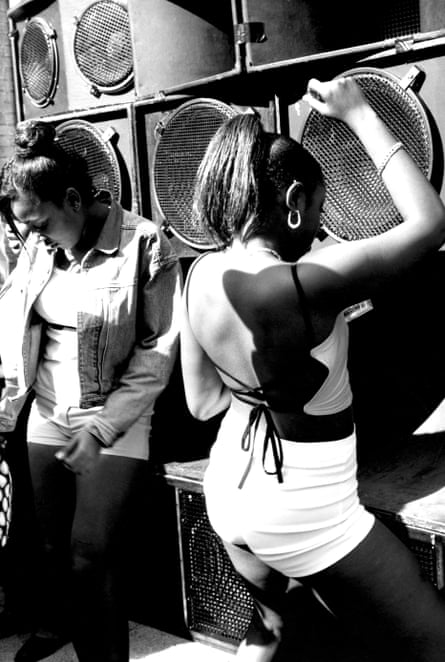
Metro Glory (Science of Sound): ‘They said I was playing mad music’
Nigel Sterling: “One day my dad came back from Jamaica with U-Roy’s Version Galore album, which I played until I wore it out. Hackney was full of sound systems then. There were 10 to 15 in the Kingsmead estate alone. I’d get my Sunday school clothes grubbed up from listening to them. From a young age I told people: ‘I’m gonna have one of the biggest sound systems in England.’
“I chose physics, electronics art and woodwork at school, so I could design and construct it, and built my first speakers using wood left behind on building sites. Every sound system is different – you design what is in your head. I called it Trojan then.
“I first did carnival in 1989, just drove up and played under a garage on Westbourne Park Road. We try to entertain everybody and it’s about positive music, food and dancing. I’ve played every genre. I was the first reggae sound in my area to play house, garage and jungle. I got cussed and told I was playing ‘mad music’. Two years later, everyone was playing it.”
Sir Lloyd: ‘It’s 2,000 watts and I want to double it’
Lloyd Roberts: “In 1976 I started Trinity Rockers sound with my classmates at Kennington boys’ school. When they packed it in I went solo. My mum’s friend suggested the name Sir Lloyd. Sometimes I played alongside Jazzie’s Soul II Soul and Trevor Nelson’s Madhatters sound. At one point my crew had 14 people and my sister was an MC, Sister Candy. In the 70s I played reggae, soul and calypso but in the 80s I started playing hip-hop tunes such as Grandmaster Flash’s The Message and Gary Byrd’s The Crown, which led to funky house, jungle and drum’n’bass. Now we play bashment and Afrobeats, too.
“I first played carnival in 85 or 86. It’s been much more regulated since a man was stabbed to death in 87, but it’s still carnival. We’ve had people like Sean Paul, Lily Allen and Craig David DJing and singing. My sound system is currently 2,000 watts and I want to double it. Jamaican sound systems set the trend for sub-bass – some go up to 9,000 or more – it’s crazy out there! – but we can hold our own. Pirate radio hurt sound systems culture for a while, but then we realised we could coexist – it’s all about spreading the music.”
Latin Rave Street Jam: ‘People go: What kind of music is this?’
Sylvester Harrison: “We used to bunk off school to hear [Kiss FM founder] George Power and Paul ‘Trouble’ Anderson’s lunchtime club from 12-3 at Cracker’s on Wardour Street – heavy funk and boogie jazz. My DJ mate Baz for Jazz introduced me to Gilles Peterson – we played jazz together at the Wag Club and I got further into Latin, which nobody was playing at carnival. One year I got a couple of speakers and just set up on Portobello Road, which you could do then, and the system grew from there.
“I must have done at least 25 carnivals now and it’s such a calm, beautiful vibe. Some people go: ‘What kind of music is this? I’ve never heard anything like it before’, which is brilliant. We’ve had the London School of Samba play with us with drums and whistles. One year this old man came up and said: ‘I’ve lived in the carnival area for 40 years and never heard anyone play jazz. I heard you from streets away, followed the sound and you were playing Miles Davis. It made my day.’”
Arts-A-Light: ‘Jesus would have gone to carnival’
Angela Essien: “I started running the sound system 10 years ago. I’m not a typical sound system person. My background is in theatre arts and pageants, but I brought that to carnival. We’re one of the few sound systems that straddle disciplines, so we have a sound system, DJs, live acts and our own costumed band, the Bride. We go live from noon until 7pm and I treat the sound system as a seven-hour concert.
“We play various types of gospel, which is incredibly powerful and can stretch to rap, grime, house and Afrobeats, celebrating carnival’s roots in the Caribbean and before that Africa and the connection with the church. Our DJs have ranged from ex-BBC 1Xtra gospel presenter DJ Fitz to DJs Edu and Asante. This year we’ll have a female DJ, Shunz. Women are starting to DJ much more. We have an open-mic gospel-singing competition, which is so much fun that people can’t wait to get the mic off each other.
“People say that carnival and church don’t mix but I think that Jesus would have been at carnival, getting the good news across to people. For two days the streets belong to the residents and the people, and I would hope that the residents bear with us for that one weekend in a year. There’s nothing like carnival. On our mobile truck, we’ve turned tracks like Graham Kendrick’s Heaven Is in My Heart into soca, creating gospelly soca just for carnival. We attract anyone who wants a taste of the event and a family-friendly environment for their kids.”

Rough But Sweet: ‘I’ve never seen a cross word’
Michael Lamond: “I went to my first carnival in 1982, was instantly hooked and wanted to become part of it. I was a DJ for about five years and then I found someone who could build my first speakers and I started running the sound system with several others. This is our 28th year at carnival and it’s still such a thrill to do. I’ve worked with Chase & Status and Rinse FM, and have had artists from Ne-Yo to Ms Dynamite performing on the sound system. When we started we were mainly reggae, but now we play R&B, soul, grime – anything.
“Our theme this year is knife crime. I’d love to start a teaching school to get the younger generation into sound system culture to keep them out of trouble. In 28 years at the same spot in carnival, I’ve never seen so much as a cross word and it’s a safe environment for everybody, whatever their colour or who they are.
“I juggle the sound system with a day job. If everyone who came to carnival paid a pound then yeah, I’d give up my day job! But we do it for the love. I’m just a guy who lives in south London, but on those two days I transform into a musical ambassador, putting on a show to entertain the public.”
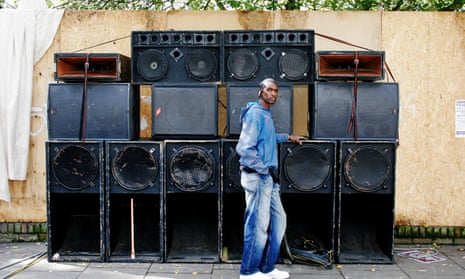
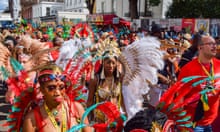
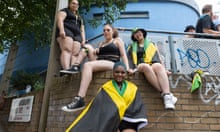

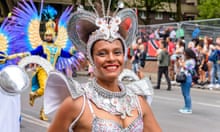

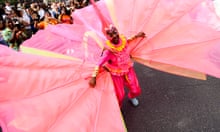
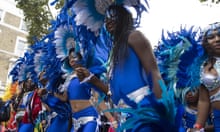


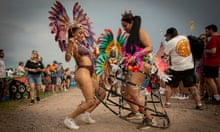
Comments (…)
Sign in or create your Guardian account to join the discussion